Leadership and Management: Reflective Writing on The Sheep and Sheppard Task
VerifiedAdded on 2023/06/10
|8
|2896
|260
AI Summary
This reflective writing paper discusses the approach related to the leadership and management based on the “THE SHEEP AND SHEPPARD TASK”. It highlights the importance of different skills and abilities for becoming effective leaders.
Contribute Materials
Your contribution can guide someone’s learning journey. Share your
documents today.
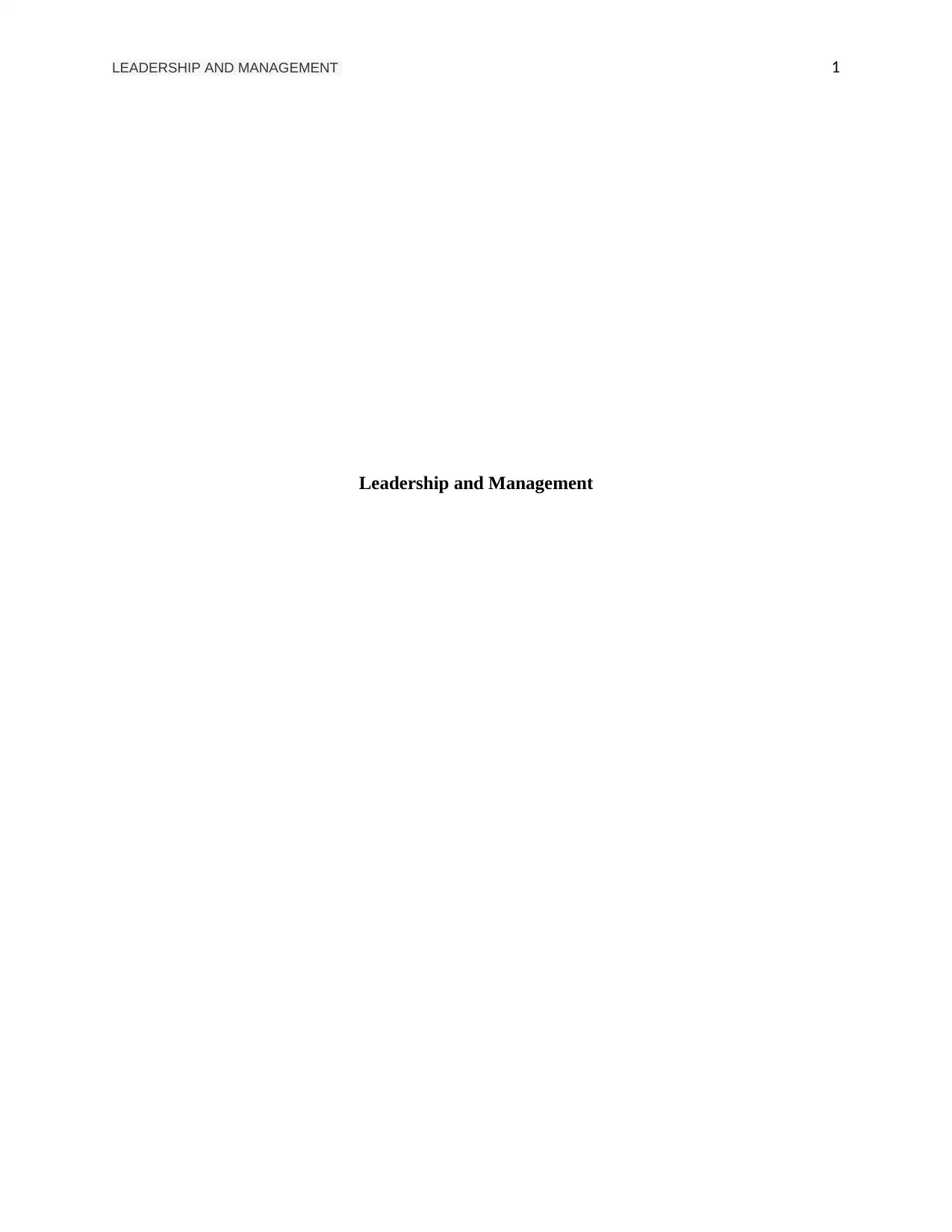
LEADERSHIP AND MANAGEMENT 1
Leadership and Management
Leadership and Management
Secure Best Marks with AI Grader
Need help grading? Try our AI Grader for instant feedback on your assignments.
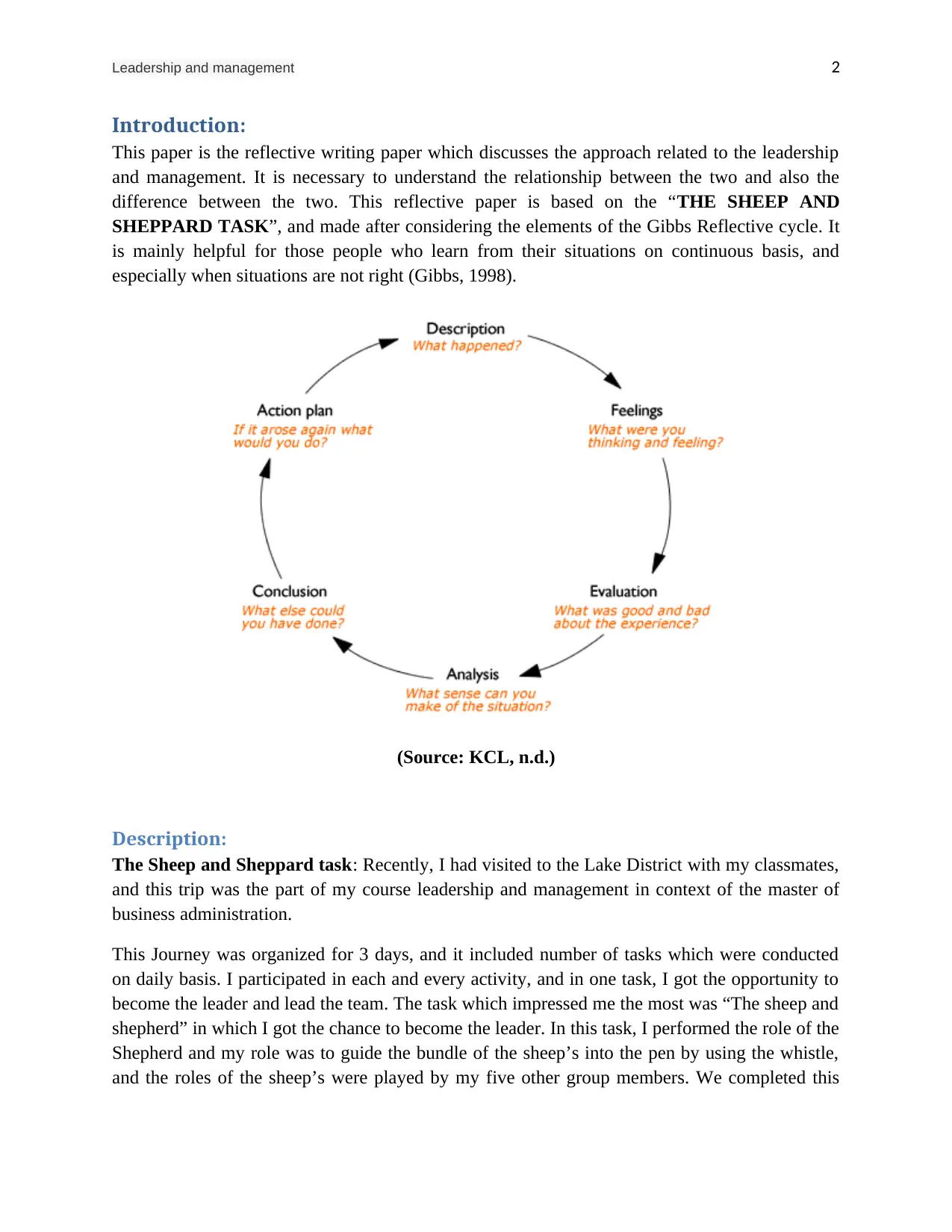
Leadership and management 2
Introduction:
This paper is the reflective writing paper which discusses the approach related to the leadership
and management. It is necessary to understand the relationship between the two and also the
difference between the two. This reflective paper is based on the “THE SHEEP AND
SHEPPARD TASK”, and made after considering the elements of the Gibbs Reflective cycle. It
is mainly helpful for those people who learn from their situations on continuous basis, and
especially when situations are not right (Gibbs, 1998).
(Source: KCL, n.d.)
Description:
The Sheep and Sheppard task: Recently, I had visited to the Lake District with my classmates,
and this trip was the part of my course leadership and management in context of the master of
business administration.
This Journey was organized for 3 days, and it included number of tasks which were conducted
on daily basis. I participated in each and every activity, and in one task, I got the opportunity to
become the leader and lead the team. The task which impressed me the most was “The sheep and
shepherd” in which I got the chance to become the leader. In this task, I performed the role of the
Shepherd and my role was to guide the bundle of the sheep’s into the pen by using the whistle,
and the roles of the sheep’s were played by my five other group members. We completed this
Introduction:
This paper is the reflective writing paper which discusses the approach related to the leadership
and management. It is necessary to understand the relationship between the two and also the
difference between the two. This reflective paper is based on the “THE SHEEP AND
SHEPPARD TASK”, and made after considering the elements of the Gibbs Reflective cycle. It
is mainly helpful for those people who learn from their situations on continuous basis, and
especially when situations are not right (Gibbs, 1998).
(Source: KCL, n.d.)
Description:
The Sheep and Sheppard task: Recently, I had visited to the Lake District with my classmates,
and this trip was the part of my course leadership and management in context of the master of
business administration.
This Journey was organized for 3 days, and it included number of tasks which were conducted
on daily basis. I participated in each and every activity, and in one task, I got the opportunity to
become the leader and lead the team. The task which impressed me the most was “The sheep and
shepherd” in which I got the chance to become the leader. In this task, I performed the role of the
Shepherd and my role was to guide the bundle of the sheep’s into the pen by using the whistle,
and the roles of the sheep’s were played by my five other group members. We completed this
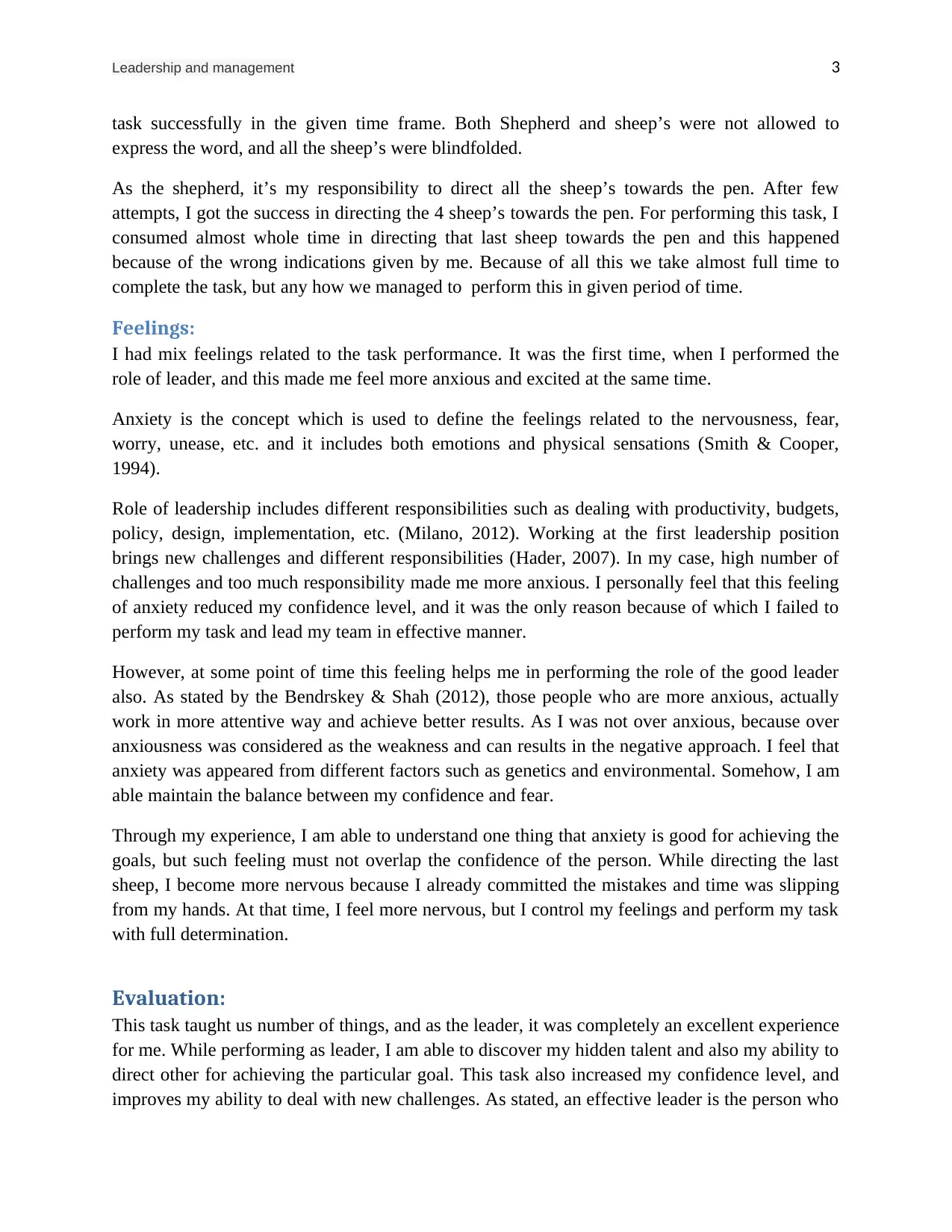
Leadership and management 3
task successfully in the given time frame. Both Shepherd and sheep’s were not allowed to
express the word, and all the sheep’s were blindfolded.
As the shepherd, it’s my responsibility to direct all the sheep’s towards the pen. After few
attempts, I got the success in directing the 4 sheep’s towards the pen. For performing this task, I
consumed almost whole time in directing that last sheep towards the pen and this happened
because of the wrong indications given by me. Because of all this we take almost full time to
complete the task, but any how we managed to perform this in given period of time.
Feelings:
I had mix feelings related to the task performance. It was the first time, when I performed the
role of leader, and this made me feel more anxious and excited at the same time.
Anxiety is the concept which is used to define the feelings related to the nervousness, fear,
worry, unease, etc. and it includes both emotions and physical sensations (Smith & Cooper,
1994).
Role of leadership includes different responsibilities such as dealing with productivity, budgets,
policy, design, implementation, etc. (Milano, 2012). Working at the first leadership position
brings new challenges and different responsibilities (Hader, 2007). In my case, high number of
challenges and too much responsibility made me more anxious. I personally feel that this feeling
of anxiety reduced my confidence level, and it was the only reason because of which I failed to
perform my task and lead my team in effective manner.
However, at some point of time this feeling helps me in performing the role of the good leader
also. As stated by the Bendrskey & Shah (2012), those people who are more anxious, actually
work in more attentive way and achieve better results. As I was not over anxious, because over
anxiousness was considered as the weakness and can results in the negative approach. I feel that
anxiety was appeared from different factors such as genetics and environmental. Somehow, I am
able maintain the balance between my confidence and fear.
Through my experience, I am able to understand one thing that anxiety is good for achieving the
goals, but such feeling must not overlap the confidence of the person. While directing the last
sheep, I become more nervous because I already committed the mistakes and time was slipping
from my hands. At that time, I feel more nervous, but I control my feelings and perform my task
with full determination.
Evaluation:
This task taught us number of things, and as the leader, it was completely an excellent experience
for me. While performing as leader, I am able to discover my hidden talent and also my ability to
direct other for achieving the particular goal. This task also increased my confidence level, and
improves my ability to deal with new challenges. As stated, an effective leader is the person who
task successfully in the given time frame. Both Shepherd and sheep’s were not allowed to
express the word, and all the sheep’s were blindfolded.
As the shepherd, it’s my responsibility to direct all the sheep’s towards the pen. After few
attempts, I got the success in directing the 4 sheep’s towards the pen. For performing this task, I
consumed almost whole time in directing that last sheep towards the pen and this happened
because of the wrong indications given by me. Because of all this we take almost full time to
complete the task, but any how we managed to perform this in given period of time.
Feelings:
I had mix feelings related to the task performance. It was the first time, when I performed the
role of leader, and this made me feel more anxious and excited at the same time.
Anxiety is the concept which is used to define the feelings related to the nervousness, fear,
worry, unease, etc. and it includes both emotions and physical sensations (Smith & Cooper,
1994).
Role of leadership includes different responsibilities such as dealing with productivity, budgets,
policy, design, implementation, etc. (Milano, 2012). Working at the first leadership position
brings new challenges and different responsibilities (Hader, 2007). In my case, high number of
challenges and too much responsibility made me more anxious. I personally feel that this feeling
of anxiety reduced my confidence level, and it was the only reason because of which I failed to
perform my task and lead my team in effective manner.
However, at some point of time this feeling helps me in performing the role of the good leader
also. As stated by the Bendrskey & Shah (2012), those people who are more anxious, actually
work in more attentive way and achieve better results. As I was not over anxious, because over
anxiousness was considered as the weakness and can results in the negative approach. I feel that
anxiety was appeared from different factors such as genetics and environmental. Somehow, I am
able maintain the balance between my confidence and fear.
Through my experience, I am able to understand one thing that anxiety is good for achieving the
goals, but such feeling must not overlap the confidence of the person. While directing the last
sheep, I become more nervous because I already committed the mistakes and time was slipping
from my hands. At that time, I feel more nervous, but I control my feelings and perform my task
with full determination.
Evaluation:
This task taught us number of things, and as the leader, it was completely an excellent experience
for me. While performing as leader, I am able to discover my hidden talent and also my ability to
direct other for achieving the particular goal. This task also increased my confidence level, and
improves my ability to deal with new challenges. As stated, an effective leader is the person who
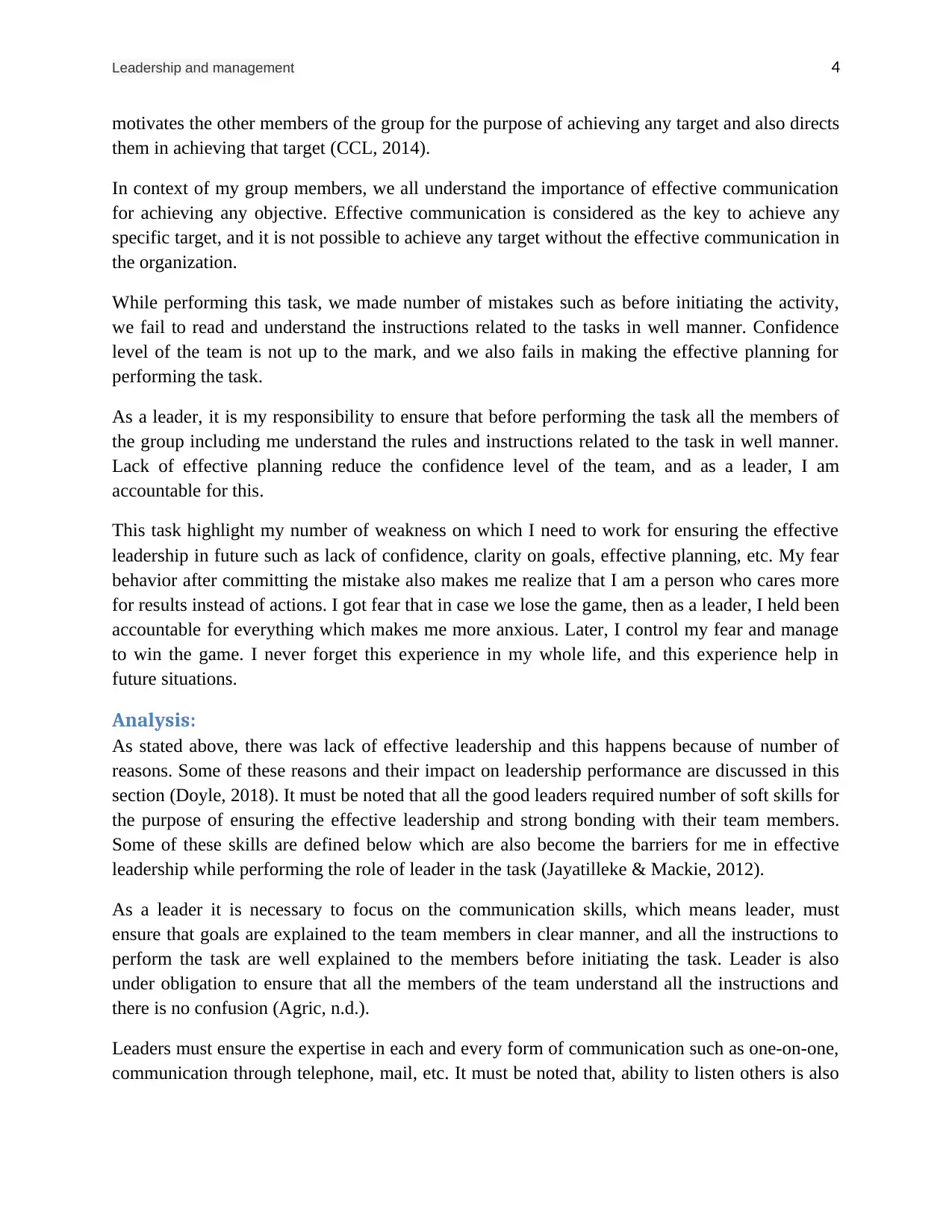
Leadership and management 4
motivates the other members of the group for the purpose of achieving any target and also directs
them in achieving that target (CCL, 2014).
In context of my group members, we all understand the importance of effective communication
for achieving any objective. Effective communication is considered as the key to achieve any
specific target, and it is not possible to achieve any target without the effective communication in
the organization.
While performing this task, we made number of mistakes such as before initiating the activity,
we fail to read and understand the instructions related to the tasks in well manner. Confidence
level of the team is not up to the mark, and we also fails in making the effective planning for
performing the task.
As a leader, it is my responsibility to ensure that before performing the task all the members of
the group including me understand the rules and instructions related to the task in well manner.
Lack of effective planning reduce the confidence level of the team, and as a leader, I am
accountable for this.
This task highlight my number of weakness on which I need to work for ensuring the effective
leadership in future such as lack of confidence, clarity on goals, effective planning, etc. My fear
behavior after committing the mistake also makes me realize that I am a person who cares more
for results instead of actions. I got fear that in case we lose the game, then as a leader, I held been
accountable for everything which makes me more anxious. Later, I control my fear and manage
to win the game. I never forget this experience in my whole life, and this experience help in
future situations.
Analysis:
As stated above, there was lack of effective leadership and this happens because of number of
reasons. Some of these reasons and their impact on leadership performance are discussed in this
section (Doyle, 2018). It must be noted that all the good leaders required number of soft skills for
the purpose of ensuring the effective leadership and strong bonding with their team members.
Some of these skills are defined below which are also become the barriers for me in effective
leadership while performing the role of leader in the task (Jayatilleke & Mackie, 2012).
As a leader it is necessary to focus on the communication skills, which means leader, must
ensure that goals are explained to the team members in clear manner, and all the instructions to
perform the task are well explained to the members before initiating the task. Leader is also
under obligation to ensure that all the members of the team understand all the instructions and
there is no confusion (Agric, n.d.).
Leaders must ensure the expertise in each and every form of communication such as one-on-one,
communication through telephone, mail, etc. It must be noted that, ability to listen others is also
motivates the other members of the group for the purpose of achieving any target and also directs
them in achieving that target (CCL, 2014).
In context of my group members, we all understand the importance of effective communication
for achieving any objective. Effective communication is considered as the key to achieve any
specific target, and it is not possible to achieve any target without the effective communication in
the organization.
While performing this task, we made number of mistakes such as before initiating the activity,
we fail to read and understand the instructions related to the tasks in well manner. Confidence
level of the team is not up to the mark, and we also fails in making the effective planning for
performing the task.
As a leader, it is my responsibility to ensure that before performing the task all the members of
the group including me understand the rules and instructions related to the task in well manner.
Lack of effective planning reduce the confidence level of the team, and as a leader, I am
accountable for this.
This task highlight my number of weakness on which I need to work for ensuring the effective
leadership in future such as lack of confidence, clarity on goals, effective planning, etc. My fear
behavior after committing the mistake also makes me realize that I am a person who cares more
for results instead of actions. I got fear that in case we lose the game, then as a leader, I held been
accountable for everything which makes me more anxious. Later, I control my fear and manage
to win the game. I never forget this experience in my whole life, and this experience help in
future situations.
Analysis:
As stated above, there was lack of effective leadership and this happens because of number of
reasons. Some of these reasons and their impact on leadership performance are discussed in this
section (Doyle, 2018). It must be noted that all the good leaders required number of soft skills for
the purpose of ensuring the effective leadership and strong bonding with their team members.
Some of these skills are defined below which are also become the barriers for me in effective
leadership while performing the role of leader in the task (Jayatilleke & Mackie, 2012).
As a leader it is necessary to focus on the communication skills, which means leader, must
ensure that goals are explained to the team members in clear manner, and all the instructions to
perform the task are well explained to the members before initiating the task. Leader is also
under obligation to ensure that all the members of the team understand all the instructions and
there is no confusion (Agric, n.d.).
Leaders must ensure the expertise in each and every form of communication such as one-on-one,
communication through telephone, mail, etc. It must be noted that, ability to listen others is also
Secure Best Marks with AI Grader
Need help grading? Try our AI Grader for instant feedback on your assignments.
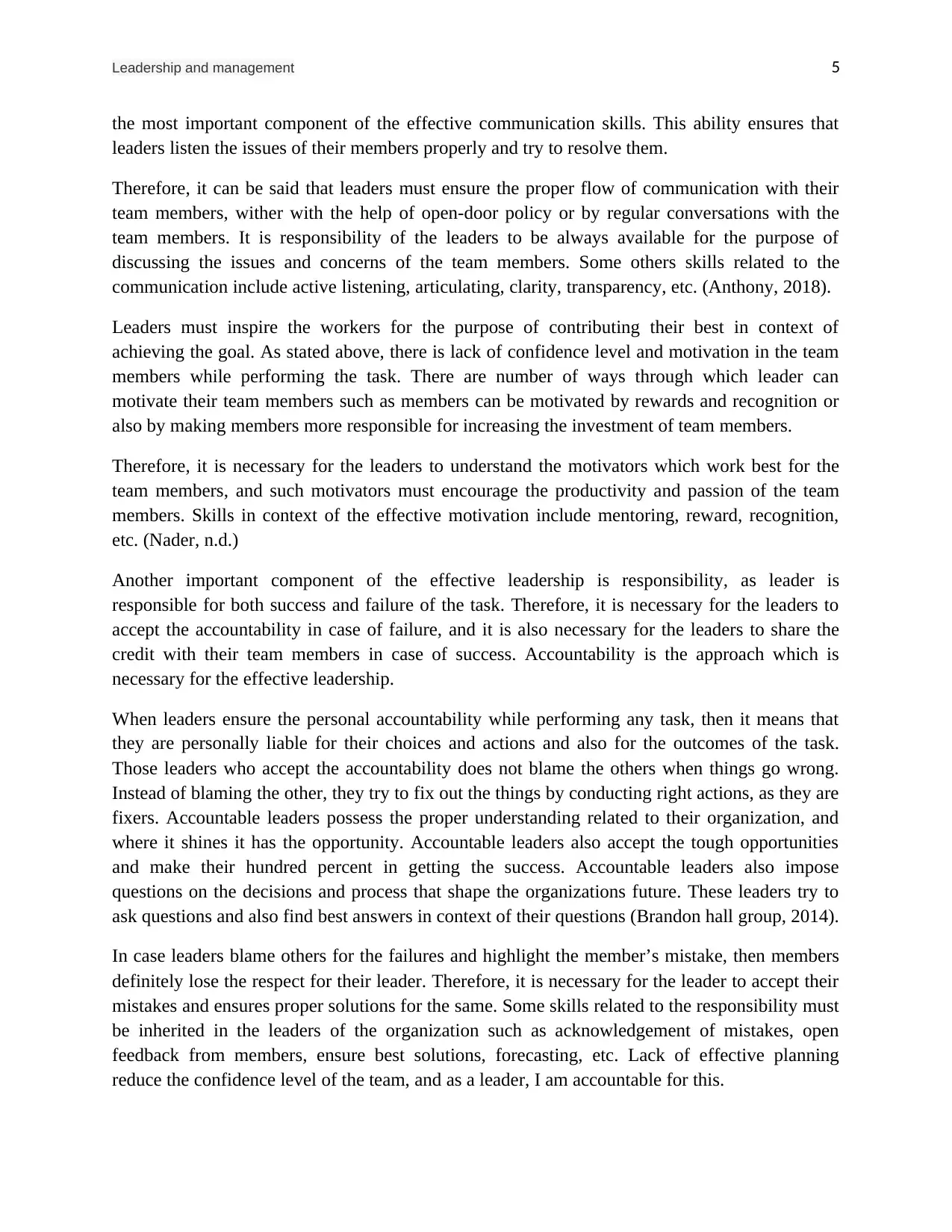
Leadership and management 5
the most important component of the effective communication skills. This ability ensures that
leaders listen the issues of their members properly and try to resolve them.
Therefore, it can be said that leaders must ensure the proper flow of communication with their
team members, wither with the help of open-door policy or by regular conversations with the
team members. It is responsibility of the leaders to be always available for the purpose of
discussing the issues and concerns of the team members. Some others skills related to the
communication include active listening, articulating, clarity, transparency, etc. (Anthony, 2018).
Leaders must inspire the workers for the purpose of contributing their best in context of
achieving the goal. As stated above, there is lack of confidence level and motivation in the team
members while performing the task. There are number of ways through which leader can
motivate their team members such as members can be motivated by rewards and recognition or
also by making members more responsible for increasing the investment of team members.
Therefore, it is necessary for the leaders to understand the motivators which work best for the
team members, and such motivators must encourage the productivity and passion of the team
members. Skills in context of the effective motivation include mentoring, reward, recognition,
etc. (Nader, n.d.)
Another important component of the effective leadership is responsibility, as leader is
responsible for both success and failure of the task. Therefore, it is necessary for the leaders to
accept the accountability in case of failure, and it is also necessary for the leaders to share the
credit with their team members in case of success. Accountability is the approach which is
necessary for the effective leadership.
When leaders ensure the personal accountability while performing any task, then it means that
they are personally liable for their choices and actions and also for the outcomes of the task.
Those leaders who accept the accountability does not blame the others when things go wrong.
Instead of blaming the other, they try to fix out the things by conducting right actions, as they are
fixers. Accountable leaders possess the proper understanding related to their organization, and
where it shines it has the opportunity. Accountable leaders also accept the tough opportunities
and make their hundred percent in getting the success. Accountable leaders also impose
questions on the decisions and process that shape the organizations future. These leaders try to
ask questions and also find best answers in context of their questions (Brandon hall group, 2014).
In case leaders blame others for the failures and highlight the member’s mistake, then members
definitely lose the respect for their leader. Therefore, it is necessary for the leader to accept their
mistakes and ensures proper solutions for the same. Some skills related to the responsibility must
be inherited in the leaders of the organization such as acknowledgement of mistakes, open
feedback from members, ensure best solutions, forecasting, etc. Lack of effective planning
reduce the confidence level of the team, and as a leader, I am accountable for this.
the most important component of the effective communication skills. This ability ensures that
leaders listen the issues of their members properly and try to resolve them.
Therefore, it can be said that leaders must ensure the proper flow of communication with their
team members, wither with the help of open-door policy or by regular conversations with the
team members. It is responsibility of the leaders to be always available for the purpose of
discussing the issues and concerns of the team members. Some others skills related to the
communication include active listening, articulating, clarity, transparency, etc. (Anthony, 2018).
Leaders must inspire the workers for the purpose of contributing their best in context of
achieving the goal. As stated above, there is lack of confidence level and motivation in the team
members while performing the task. There are number of ways through which leader can
motivate their team members such as members can be motivated by rewards and recognition or
also by making members more responsible for increasing the investment of team members.
Therefore, it is necessary for the leaders to understand the motivators which work best for the
team members, and such motivators must encourage the productivity and passion of the team
members. Skills in context of the effective motivation include mentoring, reward, recognition,
etc. (Nader, n.d.)
Another important component of the effective leadership is responsibility, as leader is
responsible for both success and failure of the task. Therefore, it is necessary for the leaders to
accept the accountability in case of failure, and it is also necessary for the leaders to share the
credit with their team members in case of success. Accountability is the approach which is
necessary for the effective leadership.
When leaders ensure the personal accountability while performing any task, then it means that
they are personally liable for their choices and actions and also for the outcomes of the task.
Those leaders who accept the accountability does not blame the others when things go wrong.
Instead of blaming the other, they try to fix out the things by conducting right actions, as they are
fixers. Accountable leaders possess the proper understanding related to their organization, and
where it shines it has the opportunity. Accountable leaders also accept the tough opportunities
and make their hundred percent in getting the success. Accountable leaders also impose
questions on the decisions and process that shape the organizations future. These leaders try to
ask questions and also find best answers in context of their questions (Brandon hall group, 2014).
In case leaders blame others for the failures and highlight the member’s mistake, then members
definitely lose the respect for their leader. Therefore, it is necessary for the leader to accept their
mistakes and ensures proper solutions for the same. Some skills related to the responsibility must
be inherited in the leaders of the organization such as acknowledgement of mistakes, open
feedback from members, ensure best solutions, forecasting, etc. Lack of effective planning
reduce the confidence level of the team, and as a leader, I am accountable for this.
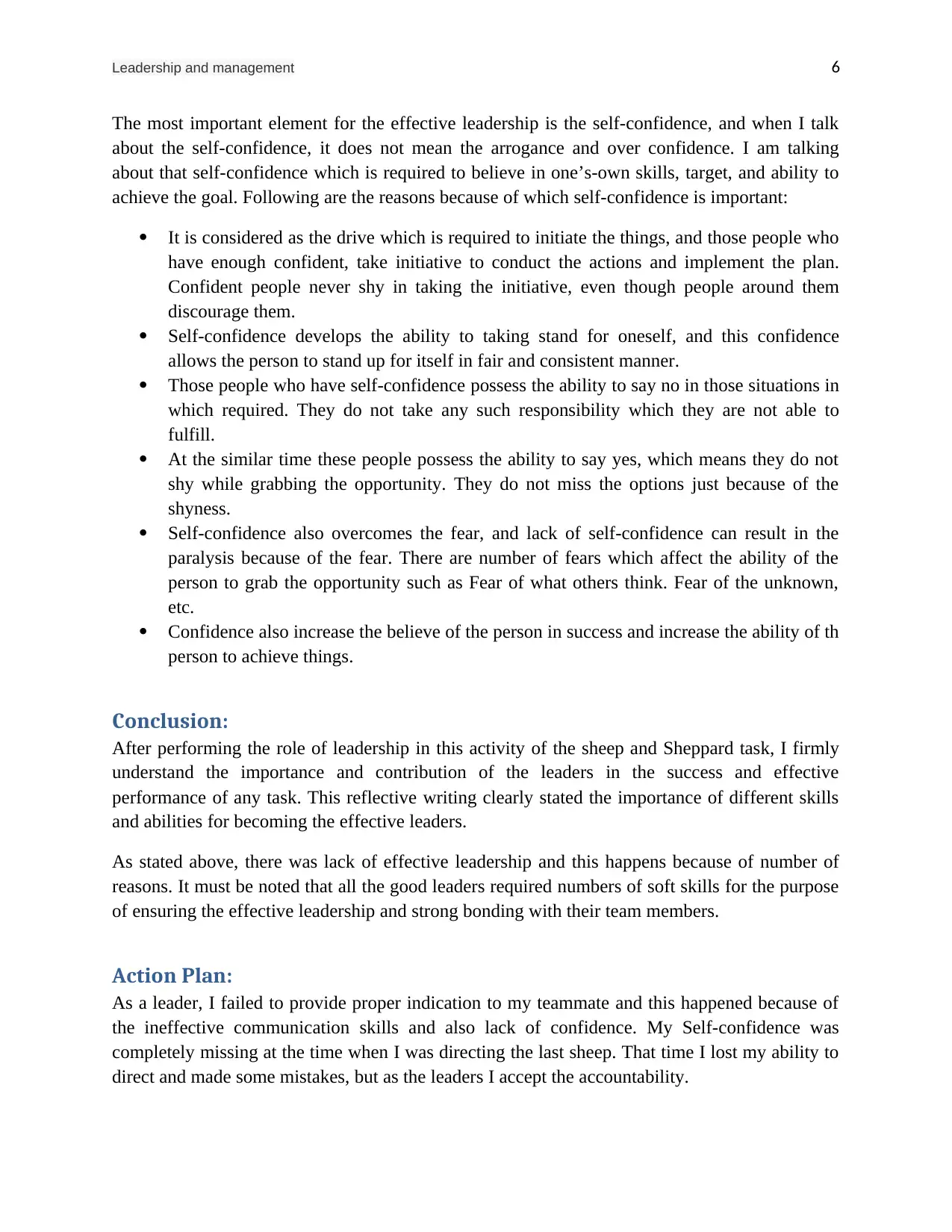
Leadership and management 6
The most important element for the effective leadership is the self-confidence, and when I talk
about the self-confidence, it does not mean the arrogance and over confidence. I am talking
about that self-confidence which is required to believe in one’s-own skills, target, and ability to
achieve the goal. Following are the reasons because of which self-confidence is important:
It is considered as the drive which is required to initiate the things, and those people who
have enough confident, take initiative to conduct the actions and implement the plan.
Confident people never shy in taking the initiative, even though people around them
discourage them.
Self-confidence develops the ability to taking stand for oneself, and this confidence
allows the person to stand up for itself in fair and consistent manner.
Those people who have self-confidence possess the ability to say no in those situations in
which required. They do not take any such responsibility which they are not able to
fulfill.
At the similar time these people possess the ability to say yes, which means they do not
shy while grabbing the opportunity. They do not miss the options just because of the
shyness.
Self-confidence also overcomes the fear, and lack of self-confidence can result in the
paralysis because of the fear. There are number of fears which affect the ability of the
person to grab the opportunity such as Fear of what others think. Fear of the unknown,
etc.
Confidence also increase the believe of the person in success and increase the ability of th
person to achieve things.
Conclusion:
After performing the role of leadership in this activity of the sheep and Sheppard task, I firmly
understand the importance and contribution of the leaders in the success and effective
performance of any task. This reflective writing clearly stated the importance of different skills
and abilities for becoming the effective leaders.
As stated above, there was lack of effective leadership and this happens because of number of
reasons. It must be noted that all the good leaders required numbers of soft skills for the purpose
of ensuring the effective leadership and strong bonding with their team members.
Action Plan:
As a leader, I failed to provide proper indication to my teammate and this happened because of
the ineffective communication skills and also lack of confidence. My Self-confidence was
completely missing at the time when I was directing the last sheep. That time I lost my ability to
direct and made some mistakes, but as the leaders I accept the accountability.
The most important element for the effective leadership is the self-confidence, and when I talk
about the self-confidence, it does not mean the arrogance and over confidence. I am talking
about that self-confidence which is required to believe in one’s-own skills, target, and ability to
achieve the goal. Following are the reasons because of which self-confidence is important:
It is considered as the drive which is required to initiate the things, and those people who
have enough confident, take initiative to conduct the actions and implement the plan.
Confident people never shy in taking the initiative, even though people around them
discourage them.
Self-confidence develops the ability to taking stand for oneself, and this confidence
allows the person to stand up for itself in fair and consistent manner.
Those people who have self-confidence possess the ability to say no in those situations in
which required. They do not take any such responsibility which they are not able to
fulfill.
At the similar time these people possess the ability to say yes, which means they do not
shy while grabbing the opportunity. They do not miss the options just because of the
shyness.
Self-confidence also overcomes the fear, and lack of self-confidence can result in the
paralysis because of the fear. There are number of fears which affect the ability of the
person to grab the opportunity such as Fear of what others think. Fear of the unknown,
etc.
Confidence also increase the believe of the person in success and increase the ability of th
person to achieve things.
Conclusion:
After performing the role of leadership in this activity of the sheep and Sheppard task, I firmly
understand the importance and contribution of the leaders in the success and effective
performance of any task. This reflective writing clearly stated the importance of different skills
and abilities for becoming the effective leaders.
As stated above, there was lack of effective leadership and this happens because of number of
reasons. It must be noted that all the good leaders required numbers of soft skills for the purpose
of ensuring the effective leadership and strong bonding with their team members.
Action Plan:
As a leader, I failed to provide proper indication to my teammate and this happened because of
the ineffective communication skills and also lack of confidence. My Self-confidence was
completely missing at the time when I was directing the last sheep. That time I lost my ability to
direct and made some mistakes, but as the leaders I accept the accountability.
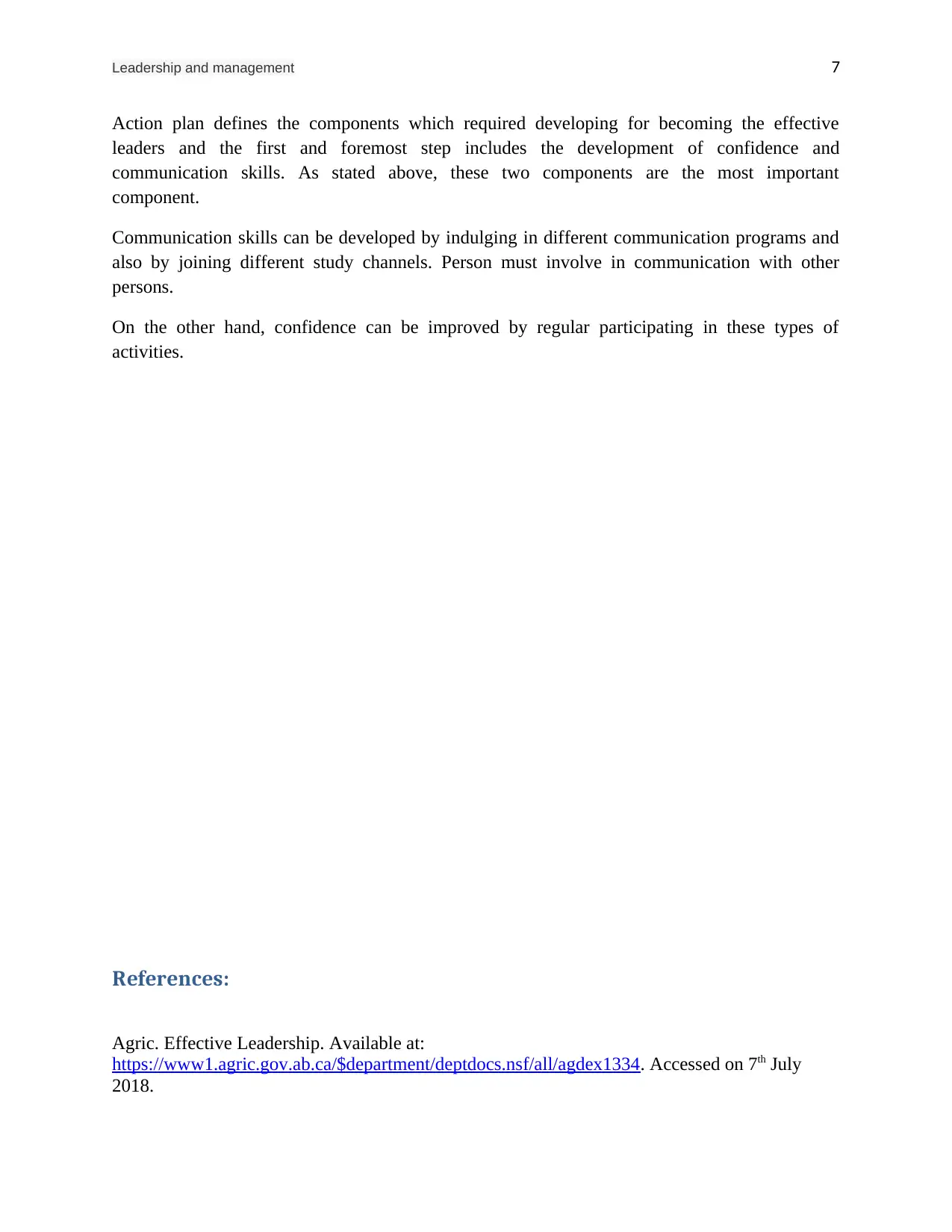
Leadership and management 7
Action plan defines the components which required developing for becoming the effective
leaders and the first and foremost step includes the development of confidence and
communication skills. As stated above, these two components are the most important
component.
Communication skills can be developed by indulging in different communication programs and
also by joining different study channels. Person must involve in communication with other
persons.
On the other hand, confidence can be improved by regular participating in these types of
activities.
References:
Agric. Effective Leadership. Available at:
https://www1.agric.gov.ab.ca/$department/deptdocs.nsf/all/agdex1334. Accessed on 7th July
2018.
Action plan defines the components which required developing for becoming the effective
leaders and the first and foremost step includes the development of confidence and
communication skills. As stated above, these two components are the most important
component.
Communication skills can be developed by indulging in different communication programs and
also by joining different study channels. Person must involve in communication with other
persons.
On the other hand, confidence can be improved by regular participating in these types of
activities.
References:
Agric. Effective Leadership. Available at:
https://www1.agric.gov.ab.ca/$department/deptdocs.nsf/all/agdex1334. Accessed on 7th July
2018.
Paraphrase This Document
Need a fresh take? Get an instant paraphrase of this document with our AI Paraphraser
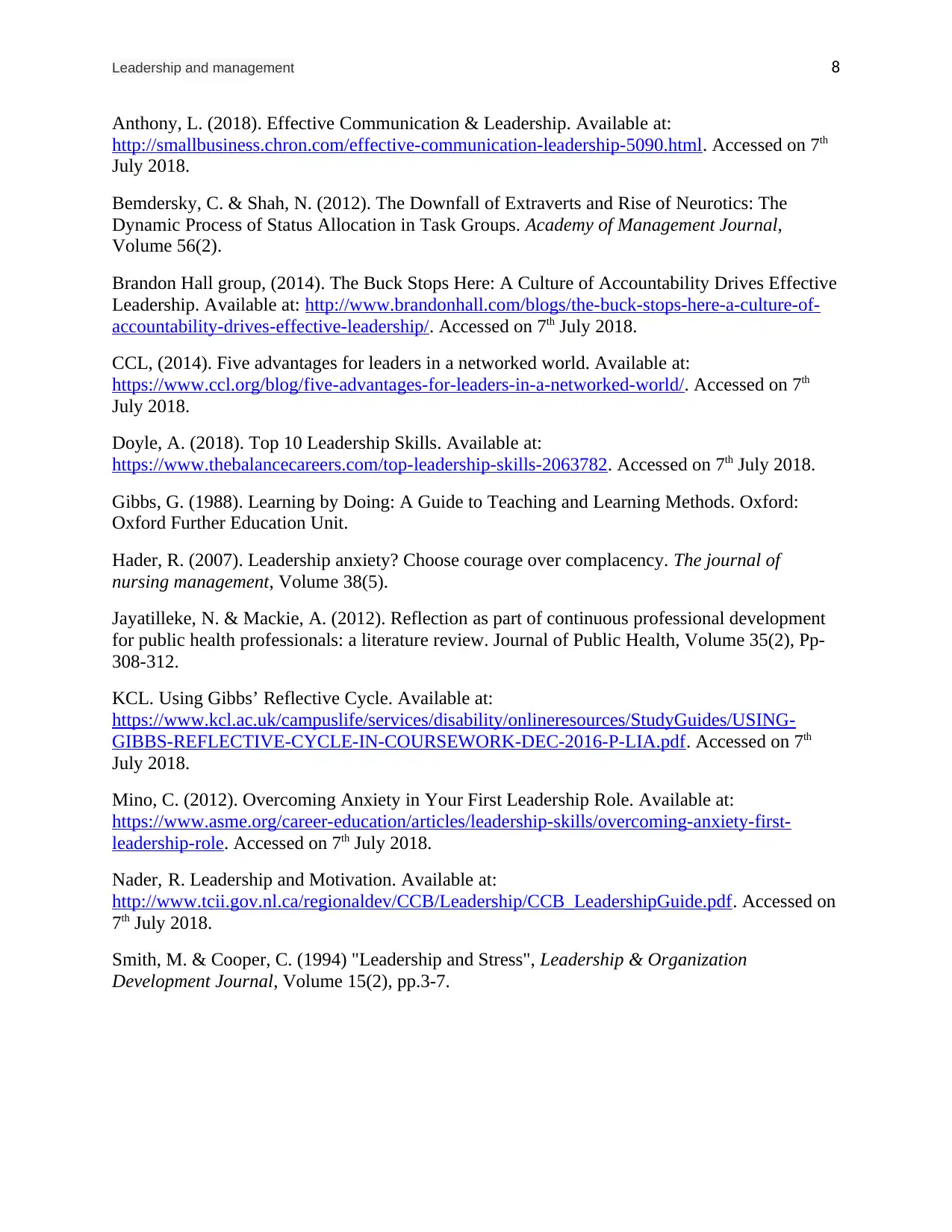
Leadership and management 8
Anthony, L. (2018). Effective Communication & Leadership. Available at:
http://smallbusiness.chron.com/effective-communication-leadership-5090.html. Accessed on 7th
July 2018.
Bemdersky, C. & Shah, N. (2012). The Downfall of Extraverts and Rise of Neurotics: The
Dynamic Process of Status Allocation in Task Groups. Academy of Management Journal,
Volume 56(2).
Brandon Hall group, (2014). The Buck Stops Here: A Culture of Accountability Drives Effective
Leadership. Available at: http://www.brandonhall.com/blogs/the-buck-stops-here-a-culture-of-
accountability-drives-effective-leadership/. Accessed on 7th July 2018.
CCL, (2014). Five advantages for leaders in a networked world. Available at:
https://www.ccl.org/blog/five-advantages-for-leaders-in-a-networked-world/. Accessed on 7th
July 2018.
Doyle, A. (2018). Top 10 Leadership Skills. Available at:
https://www.thebalancecareers.com/top-leadership-skills-2063782. Accessed on 7th July 2018.
Gibbs, G. (1988). Learning by Doing: A Guide to Teaching and Learning Methods. Oxford:
Oxford Further Education Unit.
Hader, R. (2007). Leadership anxiety? Choose courage over complacency. The journal of
nursing management, Volume 38(5).
Jayatilleke, N. & Mackie, A. (2012). Reflection as part of continuous professional development
for public health professionals: a literature review. Journal of Public Health, Volume 35(2), Pp-
308-312.
KCL. Using Gibbs’ Reflective Cycle. Available at:
https://www.kcl.ac.uk/campuslife/services/disability/onlineresources/StudyGuides/USING-
GIBBS-REFLECTIVE-CYCLE-IN-COURSEWORK-DEC-2016-P-LIA.pdf. Accessed on 7th
July 2018.
Mino, C. (2012). Overcoming Anxiety in Your First Leadership Role. Available at:
https://www.asme.org/career-education/articles/leadership-skills/overcoming-anxiety-first-
leadership-role. Accessed on 7th July 2018.
Nader, R. Leadership and Motivation. Available at:
http://www.tcii.gov.nl.ca/regionaldev/CCB/Leadership/CCB_LeadershipGuide.pdf. Accessed on
7th July 2018.
Smith, M. & Cooper, C. (1994) "Leadership and Stress", Leadership & Organization
Development Journal, Volume 15(2), pp.3-7.
Anthony, L. (2018). Effective Communication & Leadership. Available at:
http://smallbusiness.chron.com/effective-communication-leadership-5090.html. Accessed on 7th
July 2018.
Bemdersky, C. & Shah, N. (2012). The Downfall of Extraverts and Rise of Neurotics: The
Dynamic Process of Status Allocation in Task Groups. Academy of Management Journal,
Volume 56(2).
Brandon Hall group, (2014). The Buck Stops Here: A Culture of Accountability Drives Effective
Leadership. Available at: http://www.brandonhall.com/blogs/the-buck-stops-here-a-culture-of-
accountability-drives-effective-leadership/. Accessed on 7th July 2018.
CCL, (2014). Five advantages for leaders in a networked world. Available at:
https://www.ccl.org/blog/five-advantages-for-leaders-in-a-networked-world/. Accessed on 7th
July 2018.
Doyle, A. (2018). Top 10 Leadership Skills. Available at:
https://www.thebalancecareers.com/top-leadership-skills-2063782. Accessed on 7th July 2018.
Gibbs, G. (1988). Learning by Doing: A Guide to Teaching and Learning Methods. Oxford:
Oxford Further Education Unit.
Hader, R. (2007). Leadership anxiety? Choose courage over complacency. The journal of
nursing management, Volume 38(5).
Jayatilleke, N. & Mackie, A. (2012). Reflection as part of continuous professional development
for public health professionals: a literature review. Journal of Public Health, Volume 35(2), Pp-
308-312.
KCL. Using Gibbs’ Reflective Cycle. Available at:
https://www.kcl.ac.uk/campuslife/services/disability/onlineresources/StudyGuides/USING-
GIBBS-REFLECTIVE-CYCLE-IN-COURSEWORK-DEC-2016-P-LIA.pdf. Accessed on 7th
July 2018.
Mino, C. (2012). Overcoming Anxiety in Your First Leadership Role. Available at:
https://www.asme.org/career-education/articles/leadership-skills/overcoming-anxiety-first-
leadership-role. Accessed on 7th July 2018.
Nader, R. Leadership and Motivation. Available at:
http://www.tcii.gov.nl.ca/regionaldev/CCB/Leadership/CCB_LeadershipGuide.pdf. Accessed on
7th July 2018.
Smith, M. & Cooper, C. (1994) "Leadership and Stress", Leadership & Organization
Development Journal, Volume 15(2), pp.3-7.
1 out of 8
Related Documents
Your All-in-One AI-Powered Toolkit for Academic Success.
+13062052269
info@desklib.com
Available 24*7 on WhatsApp / Email
![[object Object]](/_next/static/media/star-bottom.7253800d.svg)
Unlock your academic potential
© 2024 | Zucol Services PVT LTD | All rights reserved.





